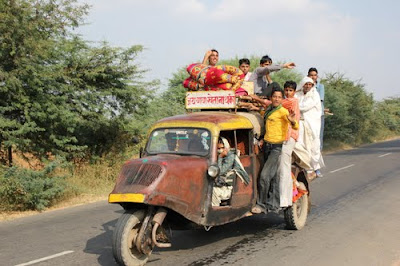First language, second language,
third language. English medium, Hindi medium, Tamil medium. Mother tongue, too.
What is this whole deal about languages all about? Right from school and at
home, there has been a constant demand to learn and preserve "our"
language. Which one, I am still to figure out. I studied English, Tamil, Hindi
and Sanskrit at school. Malayalam for a very very brief period, which
completely equals my knowledge of that language. I have relatives in Karnataka
and Maharashtra which has helped me pick
dollops of Kannada and Marathi words. Since Andhra was just a political
boundary away from home, easily one's environment had Telugu speaking people
too. Invariably, from the Tamil parodies too, I did pick a few Telugu words.
What more, you ask? I will tell you.
Fortunately or unfortunately I
could never pick up Hindi in the two years I studied it at school. My college
days in Delhi Punjab and Rajasthan. In
the end my Hindi too became a kichdi of distinct Devanagri-derived
languages. A tinge of Bhojpuri, a liberal dose of Lucknawi, a garnish of
Punjabi and viola! As a friend of mine remarked, "bhasha ka balatkar ho
gaya
In India
So with a mash of many languages,
predominantly only English, Tamil and Hindi (the rest I realise do good only
for my self-esteem!) I came bag and baggage to Haryana. First thing the
Director at SCRIA warned me was that I would find the people and their language
rough. I could definitely adjust, I then thought. A couple of months down that
day, every tenth word in my spoken language is Haryanvi. It was a necessary and
desperate move to communicate with the people. Nothing like a common language
to be the ice-breaker, I realised.
And then, this happens. I was
attending a Gram Sabha, where 40 men and only 2 women had turned up. This from
a voting population of 1800 odd. Post the Sabha, I was generally talking and
interacting with the members stating the necessity to encourage the
participation of other villagers, especially women. As it always happened,
after my speaking to them, they bombarded me with a barrage of questions.
Marital status. Check. Family members and annual income. Check. How come I know
their language? Check. The crowd soon dispersed. One old man stayed back. He
sat next to me for a minute and just smiled. I asked him if he wanted to know
anything about the Gram Sabha or Panchayat. He carefully ventured, "unn
paeru enne?" What is your name. I was pleasantly taken aback.
Like a mad monkey I just kept
staring back at him, beaming wide, forgetting the courtesy of answering his
question! "Yashaswini", I replied after a full minute. Then he went
on to say how he was in the Army, had friends from South
India and had himself stayed in Tiruchirapalli for 2 years in his
youth. Closing his eyes momentarily to recover from his memory, he counted "onnu, rendu, moonu.." as he slowly showed them with his
fingers, accompanied by a toothless, proud grin. He escorted me back to the
bus-stop, shouting to just anybody on the way, "yeh hamari bhasha bolti
hai", "yeh hamari ladki hai", "hum sab ek bolte
hain"!!
Former Subedar Jagdish Singh had
made my day. At times in the past I have struggled to explain to the villagers
here, where Chennai is. Using Tirupatti Balaji, dosas or Sridevi as
references, I usually manage. To hear Tamil this far away, I simply did not see
that coming. I can see this reciprocated in the villagers when they hear me
throw in few desi words in my language. The support staff at SCRIA
dropped their formal demeanour the day I asked them to speak with me in only
Haryanvi. Now they treat me like family. One of their own.
These instances reminded me of
times in Delhi
In all these moments- the several
"Hindi-is-the-best" sermons I have heard, Jagdish Singh counting to
three, the support staff giggling at my comic attempts to speak Haryanvi- I see
only one thing. A need to bond with the rest through the spoken word. This is
the language that is everybody's. A language that makes a mother understand the
baby's gibberish. A language that we reciprocate in a foreigner's namaste. Communication is for transaction
of information. Language is only a vessel for the emotion. We all have the same
emotions. Everybody has a language.


